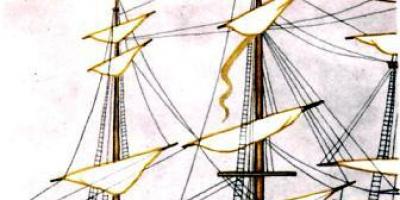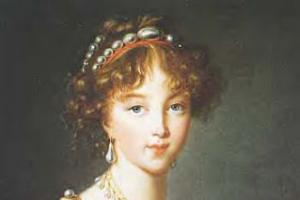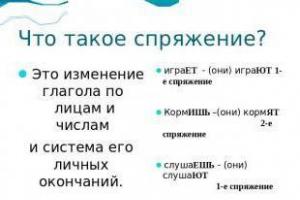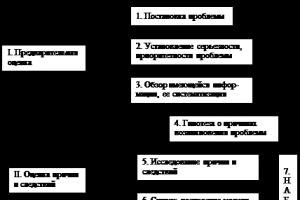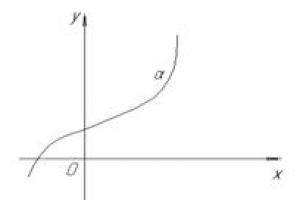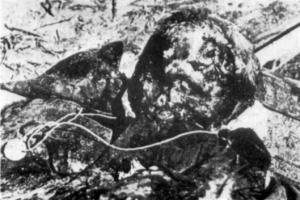“I remember a wonderful moment” is a famous poem by A.S. Pushkin, which he dedicated to his Muse, the beautiful Anna Kern. The poem describes real episodes from the writer's life.
Anna won the poet’s heart in St. Petersburg, during one of the social receptions, in the house of her aunt Elizaveta Olenina. This meeting was short, since Anna at that time was already busy with another man and raising a child from him. According to the laws of those times, it was indecent to show your feelings for a married woman.
Six years later, Pushkin meets Anna again, not far from Mikhailovsky, where he was exiled by the authorities. At this point, Anna had already left her husband, and Alexander could confess his feelings to her with a calm soul. But Anna was interested in Pushkin only as a famous person and that’s all. Her novels have long been known. After these events, the relationship between Anna and Alexander ended.
The composition of the poem can be divided into three parts. The first fragment talks about the author's meeting with a magnificent creature. The second fragment of the poem talks about a dark streak in Pushkin’s life, his exile and other trials that fate had in store for him. The last fragment describes the spiritual relief of the lyrical hero, the happiness and love that he experiences again.
The genre of the work is a love confession. In the poem, the reader can observe part of the biography of A.S. Pushkin: the first two stanzas - life in St. Petersburg, then exile to the south of the country and the last stanzas - Mikhailovskoye, where he was also exiled.
To describe the internal state of his lyrical hero, A.S. Pushkin in the poem uses such expressive means as: epithets, comparisons, metaphors.
The poem is written with cross rhyme. The meter of this work is iambic pentameter. When reading a poem, one can observe a clear musical rhythm.
“I Remember a Wonderful Moment” is one of the best lyrical works of all time.
8, 9, 10 grade
Analysis of the poem I remember a wonderful moment (K ***) by Pushkin
“I Remember a Wonderful Moment” is the more familiar title of Pushkin’s poem “To ***,” written by him in 1825.
This poem can be classified as a love letter with a slight touch of philosophical reflection. It is easy to notice that the composition traces the stages of the poet’s life: the first and second stanzas - the time spent in St. Petersburg; third stanza - stay in southern exile; and the link in Mikhailovsky is in the fourth and fifth stanzas.
The meter of the poem is iambic pentameter, the rhyme in the poem is cross.
The theme of the poem is the unexpected love of the lyrical hero, caused by a “fleeting vision of pure beauty.” This girl appears in the form of some kind of “airy”, intangible creature. From that moment on, the hero remains in “the languor of hopeless sadness,” dreaming of meeting again this girl with sweet features that he constantly dreams about. But as time passes, all feelings subside, and the young man forgets the “tender voice” and “heavenly features” of that person. And, having lost all those emotions and sensations, the hero is in despair, unable to come to terms with the loss. The endless passage of days “in the darkness of imprisonment” becomes an unbearable test. Life “without inspiration” is worse than death for a poet. And this inspiration is at the same time both the deity and the love of the hero.
But after a long time, the “fleeting vision” visited the hero again, he perked up and his soul finally “awakened.” For him, “deity, inspiration, love” were resurrected, this gave the lyrical hero the strength to start living with joy again. “The heart beats in ecstasy,” the soul becomes calm. And the poet begins to create again, inspired by his muse.
A.S. Pushkin tried to convey in this poem all the feelings experienced by the creator in the process of creating his works. Yes, sometimes it happens that the muse, whose role is often love, leaves the poet, but this is not a reason to abandon all creativity. The mental crisis that affects the creator will one day end, and inspiration will definitely return.
This poem also expresses the idea of the omnipotence of love, which cannot be completely lost, because true love will live no matter what, despite adversity and life circumstances. This love story is not an isolated incident and a fictitious situation, similar things happen to many lovers, so some people may associate themselves with the image of the main character of the poem.
Analysis of the poem I remember a wonderful moment according to plan
You might be interested
- Analysis of the poem I remember a long winter evening by Bunin 5th grade
There is probably no person who does not know Bunin and his interesting works. And one of them is not only lyrical, but also picturesque, entitled “I Remember a Long, Winter Evening”
More than anything, Yesenin liked to describe ordinary nature or the nature that is located in the village. And also all everyday problems and affairs. This work was written in 1914.
The poem "" dedicated to A.P. Kern is a magnificent example of Russian love lyrics. The theme of love literally permeates the entire work.
The creation of such an amazingly beautiful work by Pushkin was prompted by his acquaintance with the wife of the hero of the Patriotic War of 1812, Anna Petrovna Kern. The fleeting acquaintance that took place in St. Petersburg in 1819 left an indelible impression on the poet’s soul.
We know that the poet's stay in St. Petersburg was short-lived. Disgrace and exile soon followed, first to the Caucasus, and then to Mikhailovskoye. New impressions and meetings somewhat erased the image of the sweet woman from my memory.
A new meeting took place 6 years later, when Pushkin was already living in Mikhailovskoye, and Anna Petrovna came to the village of Trigorskoye to visit her aunt Praskovya Osipova. Pushkin was a frequent guest at the estate of Praskovya Alexandrovna, who was a true admirer of his talent.
When Anna Kern was getting ready to leave for her husband in Riga, where he was appointed to the post of commandant of the fortress, Pushkin presented her with an autograph of the lyrical masterpiece. It should be noted that the meeting in Trigorskoye shook up Pushkin; Anna Petrovna became the poet’s muse, inspiring him to new creations.
This lyrical work was first published by Delvig in his magazine “Northern Flowers”. In the summer of 1827, Pushkin came to St. Petersburg. Perhaps it was then that he handed over the poem to Delvig for publication.
Analyzing the poem, we see that it was written in the genre of a lyrical message. Consists of six stanzas. In terms of composition, the poem consists of three parts. Each pair of stanzas represents a certain period of the author’s life.
- Dating and falling in love
- Parting
- New meeting.
The phrases “wonderful moment” and “fleeting vision” paint an ephemeral picture: the image of a woman flashed in a crowd among men and women. Perhaps she was talking to someone, or laughing. Most likely, the poet remembered her laughter after this meeting. The woman flashed by, and the poet did not even have time to find out who she was. I only heard in my memory “a gentle voice and dreamed of sweet features.”
The second part sounds in contrast, reflecting the poet’s state of mind:
In the wilderness, in the darkness of imprisonment
My days passed quietly
Without a deity, without inspiration,
No tears, no life, no love.
And how surprised he was when, having arrived in the village of Trigorskoye to visit the Osipovs, where he was a frequent guest, he saw his “fleeting vision.” But this time she didn't disappear. For several days they had the opportunity to talk, he admired her gentle voice, admired her beauty, education and intelligence. And he even managed to present an autograph - a poem dedicated to the genius of “pure beauty”. It is no coincidence that the phrases “fleeting vision” and “genius of pure beauty” are repeated. With these words, the poet emphasizes the impression that Anna Petrovna made on him. There are few epithets in the poem, but they are very significant and figurative: gentle, fleeting, sweet, heavenly.
Each stanza has 4 lines. Cross rhyme. Male rhyme is combined with female rhyme. It’s interesting that in the first and third lines the rhymes are different, but the second and fourth lines are always the same – you. As if with this rhyme Pushkin wants to emphasize his closeness to her. It is a little surprising that Pushkin addresses Anna Petrovna on a first-name basis, which was not accepted in secular society. Moreover, Pushkin clearly emphasizes this appeal with a stressed, strong rhyme in every even-numbered line. This may indicate a huge degree of spiritual closeness and mutual understanding.
The size of the verse is iambic pentameter, making it melodious and light.
The poem is not overloaded with artistic means and lexical figures; it is written in an easy and sonorous language. It is not surprising, therefore, that this work was soon set to music and became one of the most wonderful and beloved romances. It is noteworthy that the composer Mikhail Glinka, who created the romance, dedicated it to Anna Petrovna’s daughter, Catherine, whom he loved.
The poem “I Remember a Wonderful Moment” is still interesting to readers now, 200 years later, and serves as an unsurpassed example of Russian love poetry.
On this day - July 19, 1825 - the day of Anna Petrovna Kern’s departure from Trigorskoye, Pushkin presented her with the poem “K*”, which is an example of high poetry, a masterpiece of Pushkin's lyricism. Everyone who values Russian poetry knows him. But in the history of literature there are few works that would raise as many questions among researchers, poets, and readers. Who was the real woman who inspired the poet? What connected them? Why did she become the addressee of this poetic message?
The history of the relationship between Pushkin and Anna Kern is very confused and contradictory. Despite the fact that their relationship gave birth to one of the poet’s most famous poems, this novel can hardly be called fateful for both.

The 20-year-old poet first met 19-year-old Anna Kern, the wife of 52-year-old General E. Kern, in 1819 in St. Petersburg, in the house of the president of the St. Petersburg Academy of Arts, Alexei Olenin. Sitting at dinner not far from her, he tried to attract her attention. When Kern got into the carriage, Pushkin went out onto the porch and watched her for a long time.

Their second meeting took place only six long years later. In June 1825, while in Mikhailovsky exile, Pushkin often visited relatives in the village of Trigorskoye, where he met Anna Kern again. In her memoirs, she wrote: “We were sitting at dinner and laughing... suddenly Pushkin came in with a big thick stick in his hands. My aunt, next to whom I was sitting, introduced him to me. He bowed very low, but did not say a word: timidity was visible in his movements. I also couldn’t find anything to say to him, and it took us a while to get acquainted and start talking.”

Kern stayed in Trigorskoye for about a month, meeting with Pushkin almost daily. The unexpected meeting with Kern, after a 6-year break, made an indelible impression on him. In the poet’s soul “an awakening has come” - an awakening from all the difficult experiences endured “in the wilderness, in the darkness of imprisonment” - in many years of exile. But the poet in love clearly did not find the right tone, and, despite Anna Kern’s reciprocal interest, a decisive explanation did not happen between them.

On the morning before Anna's departure, Pushkin gave her a present - the first chapter of Eugene Onegin, which had just been published. Between the uncut pages lay a piece of paper with a poem written at night...
I remember a wonderful moment:
You appeared before me,
Like a fleeting vision
Like a genius of pure beauty.
In the languor of hopeless sadness
In the worries of noisy bustle,
And I dreamed of cute features.
Years passed. The storm is a rebellious gust
Dispelled old dreams
Your heavenly features.
In the wilderness, in the darkness of imprisonment
My days passed quietly
Without a deity, without inspiration,
No tears, no life, no love.
The soul has awakened:
And then you appeared again,
Like a fleeting vision
Like a genius of pure beauty.
And the heart beats in ecstasy,
And for him they rose again
And deity and inspiration,
And life, and tears, and love.

From the memoirs of Anna Kern we know how she begged the poet for a sheet of paper with these verses. When the woman was about to hide it in her box, the poet suddenly frantically snatched it from her hands and did not want to give it back for a long time. Kern begged forcibly. “What flashed through his head then, I don’t know,” she wrote in her memoirs. By all appearances, it turns out that we should be grateful to Anna Petrovna for preserving this masterpiece for Russian literature.
15 years later, composer Mikhail Ivanovich Glinka wrote a romance based on these words and dedicated it to the woman with whom he was in love - Anna Kern's daughter Catherine.
For Pushkin, Anna Kern was truly a “fleeting vision.” In the wilderness, on her aunt’s Pskov estate, the beautiful Kern captivated not only Pushkin, but also her neighboring landowners. In one of his many letters, the poet wrote to her: “Frivolity is always cruel... Farewell, divine, I’m furious and falling at your feet.” Two years later, Anna Kern no longer aroused any feelings in Pushkin. The “genius of pure beauty” disappeared, and the “harlot of Babylon” appeared - that’s what Pushkin called her in a letter to a friend.

We will not analyze why Pushkin’s love for Kern turned out to be just a “wonderful moment,” which he prophetically announced in poetry. Whether Anna Petrovna herself was to blame for this, whether the poet or some external circumstances were to blame - the question remains open in special research.
The poem “I remember a wonderful moment...”, addressed to a hidden addressee (“K***”), has a real life basis, since it was presented by the poet to the subject of his feelings - Anna Petrovna Kern. The acquaintance with her took place in the house of Kern’s relative (president of the Academy of Arts A.N. Olenin, whose wife A.P. Kern was a niece), during Pushkin’s stay in St. Petersburg, even before exile, in 1819. The second time they met through six years. At this time, the poet was in Mikhailovskoye as an exile. The owner of the estate adjacent to Mikhailovsky, Trigorsky, turned out to be a relative of Kern, P.A. Osipova, in whose family he was warmly received. Anna Petrovna stopped by Osipova for several weeks on her way to Riga. Leaving Trigorsky, she received as a gift from the author a copy of the second chapter of the novel in verse “Eugene Onegin”, which included the message “K***”.
The first stanza (there are six quatrains in total in the poem, iambic tetrameter with cross rhyme) turns to the past, when a meeting took place, which the lyrical hero recalls as a vision of the ideal. Awareness of the reminiscent background helps to identify the meaning of the impression. The image of the “genius of pure beauty” with which the beloved is compared belongs to V.A. Zhukovsky (poem “Lalla Ruk”, 1821, which is an interpretation of the poem of the same name by T. Moore). For him, this is an angel, the embodiment of the heavenly ideal of beauty. In addition to reminding of a specific work, reminiscence is also important due to the fact that it brings to mind a number of characteristics of the ideal in the work of the romantics. For Zhukovsky, beauty is a “guest... from above,” visiting the poet in sleep, in memories, dreams, illuminating earthly life “for a minute,” which is remembered for a long time, “inseparable from the heart.”
Pushkin’s lyrical hero recalls that the meeting with his darling (“cute features”) caused the awakening of emotions and reminded him of the earthly manifestations of the divine principle, that is, both feeling and thought came to life in him in an instant, which made him magical, “wonderful”:
I remember a wonderful moment:
You appeared before me,
Like a fleeting vision
Like a genius of pure beauty.
The light of the heavenly ideal falls on the beloved, and her features acquire sublimity and tender, beautiful mystery. These impressions persist even in separation, contrasting with the “noisy bustle” of everyday life. But they sound more and more muffled (in showing a subsiding spiritual storm, the motif of a voice that appears in memory, but then forgotten - stanzas 2-3 is decisive) against its background, the reality of the past is only a dream:
The storms of the outside world are stronger than time, which did not influence the hopeless love of the lyrical hero, but even they do not have the power to “dispel” (as their impulse “Dispelled previous dreams”) his commitment to the ideal. The fourth stanza, central in the compositional division of six quatrains into two parts (three stanzas each), where attention is focused on the two stages of love. If in the first three stanzas of the poem “I remember a wonderful moment...”, the analysis of which interests us, an image is created of a feeling that arose several years ago, which tormented with its hopelessness for whole years, then in the final ones the experience changes in character and becomes an internal sensation. And then everything external is relegated to the background. In the poem there is no motive of a romantic choice between two worlds; dreams and storms of life, “the languor of hopeless sadness” and “anxiety of noisy vanity” fill the life of the lyrical hero, making him rich and diverse (a gentle voice and the noise of storm and vanity sound). The importance of focusing on internal aspects is emphasized in connection with the discovery of their life-giving (Zhukovsky) meaning: the divine principle is manifested in them. The darkness of imprisonment becomes a metaphor for the earthly prison, where the empty days of the lyrical hero stretch endlessly (the emptiness is emphasized thanks to the fivefold repetition of the preposition “without”):
In the wilderness, in the darkness of imprisonment
My days passed quietly,
Without a deity, without inspiration,
No tears, no life, no love.
Love is highlighted among all experiences; the conclusion that it is the main thing that the lyrical hero lacks is facilitated by the rising intonation, the idea of which arises thanks to the enumeration. The pinnacle to which it leads is the word “love.” In addition to intonation, phonic artistic means and unusual rhyming help to elevate the concept. In four of the six stanzas, the same consonances in male rhyme are used (in the first and fifth they repeat each other: you are beauty; in the fourth a new rhyme appears, the task of which is to highlight the key word (my - love). This effect is emphasized by the fact that there is no novelty in the female rhyme of the stanza; it is consonant with the endings of the odd terms in the first quatrain (imprisonment - inspiration - moment - vision).
At the semantic level, the meaning of love is affirmed due to the fact that the resurrection of the lyrical hero, the awakening of his soul, is associated with it. The impression is repeated, he again experiences (stanza 5) a “wonderful moment” (the literal repetition of the images of the first stanza is highlighted):
The soul has awakened,
And here we go again you appeared
Like a fleeting vision
Like a genius of pure beauty.
Love fills the heart, like an ideal, spiritualizing earthly darkness with Divine light. In the context of the analyzed poem “I remember a wonderful moment...” by Pushkin, feeling turns out to be no less important than the desire for the infinite, and, in connection with the reproduction of subjective psychological experiences, appears as a tangible and convincing manifestation of spirituality. The last stanza talks about the miracle he performed - after worries, disappointments, dangers, worries, gloomy forebodings, loneliness, the heart beats again in ecstasy, hopes and creative dreams are resurrected.
Rising intonation leads further, and at the top the main landmark is again highlighted (the intonation elevation, which enlivens oral reading, existing in the reader’s mind, thanks to the inner ear, is facilitated by enumeration - for which the sevenfold repetition of the conjunction “and” is used). The word “love” also stands out thanks to the new consonance. If the female rhyme of the sixth quatrain repeats the one that was used in the first, fourth and fifth stanzas (rapture - inspiration, rhyming with the odd lines of these quatrains, ending with the words: “moment - vision” - 1, “imprisonment - inspiration” - 4, “ awakening - vision" - 5), then the masculine one is built on the assonance “o” (again - love). It encourages one to remember consonant words in the previous text, among which were recognitions of a long memory of a fleeting impression (I remember, before me, fleeting, worries, years, tears - in these words “o” is in the stressed position) and an image expressing the tangibility of the memory : “A gentle voice sounded to me for a long time...” Together with repetitions of the sounds “e” (in addition to rhymes, the words “genius, languor, scattered, former, heavenly, soul, heart, resurrected”), “and” (“appeared, pure , dreamed, dear, your, life”) and “u” (“wonderful, sad, noisy, storms”) the assonance “o” gives a unique musicality to the poem. In the last quatrain it sounds like the final tonic (main, supporting tone):
And the heart beats in ecstasy,
And for him they rose again
Both Divinity and inspiration,
And life, and tears, and love.
The last chord completes the development of the lyrical plot, where there were wonderful moments, and years of hopeless experiences, and days of imprisonment, with an optimistic emotional note. The inner life of the lyrical hero appears as a whole world where beauty and harmony reign. Its sound, phonic characteristics are not accidental, since the impression of coherence, harmony, proportionality is easier and more convincing to convey through musical artistic means (harmony, from the Latin “proportionate, harmonious”, is the area of expressive means in music based on the combination of tones into consonances and their connections between themselves). Valery Yakovlevich Bryusov, one of the founders of Russian symbolism, called Pushkin’s skill in creating verbal symphonies (from the Greek “consonance”) “sound writing” (one of Bryusov’s many works on Pushkin’s poetry is called “Pushkin’s Sound Writing”, 1923). If you, following Bryusov and many other writers and philologists, are interested in revealing the secrets of the great poet’s talent, you will have to consider his poem not intuitively, but quite consciously and thoughtfully.
Try reading Pushkin’s poem “K***” aloud, reproducing the rising intonation in quatrains 4 and 6 (the last lines of the stanzas, where repeated prepositions or conjunctions sound), as if climbing to the top, where the word that ends the stanza reigns (“love”, “ Love"). In addition, try to hear the melody created by assonances in strong places in the text, their connection with semivowels and sonorants. It will sound major (from the Latin “bigger”, a musical mode, the stable sounds of which create a cheerful, joyful mood), despite the hopelessness and depression expressed in the content. In the second - fourth stanzas, where we talk about the loneliness of the lyrical hero (hopeless sadness, sweet features are only dreamed of, and then completely forgotten, days in the wilderness, in the darkness of imprisonment), about his difficult experiences, sound repetitions are built on the same consonants, as in the first, fifth and sixth quatrains, which convey completely different feelings. " N», « m", And " l"with vowels form melodic combinations: then mlen yah, sounding l me d ol go g olo With Not and ny, With Nile be nice y, d neither my etc. The combination within the framework of one poem “I remember a wonderful moment...”, the analysis of which we carried out, of multidirectional emotional tendencies allows us to express a harmonious worldview.
It becomes a characteristic feature of the lyrical hero in Pushkin’s poems, demonstrating his desire to accept life in all the diversity of its features, to combine attention to detail with generalization, spontaneity with philosophical depth. For him, there is nothing one-dimensional and complete in the world. For his soul, “Either all are too few, or one is enough” (“Having voluntarily renounced multiplicity...”, 1825), everything depends on the mirror where the real situation is reflected. But whether it brings details closer or allows you to look at life as a whole, the “immortal sun” is always visible above the canvas (“Bacchanalian Song”, 1825), the present is perceived as a stage (“Everything is instantaneous, everything will pass;/What will pass will be sweet” - “If life deceives you...”, 1825), a moment stopped by the will of the artist, beautiful, “wonderful” or sad, gloomy, but always sweet with its uniqueness.
Everyone knows the poem by the great Russian poet A.S. Pushkin entitled “I remember a wonderful moment...”. It is difficult to find lines filled with love and admiration for the woman you love that would surpass this work in its tenderness and reverence.
History of creation
When analyzing the poem “I Remember a Wonderful Moment,” a student can mention several facts about the history of its creation. It was written in the village of Mikhailovskoye in 1925. The Russian critic N. Skatov was convinced that not a single poet, either before or after Pushkin, could create such an image of love. One of these unusual works is the poem “I Remember a Wonderful Moment,” the analysis of which is discussed in this article.
This work was dedicated to a young beauty named Anna Kern. For the first time A.S. Pushkin saw her in St. Petersburg in 1819. was the wife of General Kern. Alexander Sergeevich first saw the girl while visiting mutual friends. The then young poet was amazed by the charm of the nineteen-year-old beauty. A.S. Pushkin and Anna Kern just exchanged a few phrases - there was no love connection between them.
A few years later, Alexander Sergeevich again had the opportunity to meet the general’s young wife. It was at that moment that beautiful lines were born, telling about the extraordinary power of love, which is capable of resurrection.

What is the work about?
The action of the poem begins with a description of one seemingly insignificant moment in the life of the poet. It describes a “fleeting moment” that is imprinted in memory. Then, through the description of emotions and experiences, the great Russian poet immerses the reader in the atmosphere of real life. At the same time, the appearance of the lyrical hero of the poem becomes clearer and clearer. His future fate becomes clear:
"In the wilderness, in the darkness of imprisonment
My days passed quietly
Without a deity, without inspiration,
No tears, no life, no love."
But the phenomenon of the “genius of pure beauty”, to whom the work is addressed, gives the lyrical hero inspiration and rapture.
Intonation
While working on the analysis of the poem “I Remember a Wonderful Moment,” the student can talk about one of the characteristic features of this work. Namely, about maintaining the same intonation throughout the entire poem. Despite the blows of fate occurring in life, the noisy bustle and various difficulties, it (intonation) remains unchanged.
And suddenly providence presents the lyrical hero with another meeting with his love. Only at this moment the intonation of the poem begins to change. The lyrical hero is filled with quiet and calm joy because he has the opportunity to once again see a creature dear to his heart. His triumphant voice does not subside, but rushes with even greater force into the heavens:
And the heart beats in ecstasy,
And for him they rose again
And deity and inspiration,
And life, and tears, and love.

Theme, genre
When analyzing the poem “I Remember a Wonderful Moment” by Pushkin, the student should also indicate the theme and genre of the work. At the end of the poem, the reader can again see the motive of awakening, the joy of life, the delight that the lyrical hero managed to regain. There is no doubt that in this work the dominant feeling is love, which can inspire a person and give him hope in a series of the most difficult storms of life.
So, the main theme of this work is love. The genre of the work is a love letter. However, you can also find philosophical reflections in it about how significant just one moment can be if it is remembered for a lifetime. Every moment like this is valuable.
Artistic media
It cannot be said that there are many artistic devices in the poem. But this is precisely what gives the work both simplicity and sophistication. The epithets used by the great Russian poet are distinguished by both sublimity and extraordinary harmony - “the genius of pure beauty”, “wonderful moment”, “favorite features”.
The simplicity of the image depicted by the author is achieved in the most familiar words. As for the passion of the work, those emotional impulses that are described in it, here Alexander Sergeevich actively uses the technique of metaphor. Love does not die, it lives despite all life circumstances. “Former dreams” are able to dispel the “rebellious impulse of storms,” but they still rise again. It is also worth noting the special melody of the work, achieved through the use of various syntactic means - anaphors, refrains, frames.
A brief analysis of the poem “I Remember a Wonderful Moment” shows that the work uses cross-type rhyme. The technique of alliteration is represented by the sonorant consonant sounds “l”, “m”, “n”. All these techniques contribute to the creation of a special melody in this unusual poem.

Composition
The entire work is written in iambic tetrameter. As for the compositional features, the poem has three equal parts. Each of them is connected with each other, while they are independent in their semantic content. The first of these parts contains memories of the poet’s wonderful meeting with his love.
The second part is more dramatic. Here there is a fading of tender feelings, until the complete onset of “silence”. The final part is structured a little differently. Here the movement goes, on the contrary, forward, with increasing spiritual elation.
Analysis of the poem “I remember a wonderful moment”: work plan
Sometimes students need to not only briefly analyze a poem, but do it according to plan. Let's look at an approximate diagram:
- Author and title of the work.
- History of creation.
- Artistic media.
- Rhythm, size.
- Features of vocabulary.
- Conclusion, student’s opinion.
Conclusion
The poem “I Remember a Wonderful Moment,” which was analyzed in this article, today remains the standard of sublime love poetry. It is a real monument to sensual impulse and deep poetic experiences. The poem intertwines images of the beloved woman and love itself - this is something bright and fragile that is painfully familiar to everyone living on earth.

